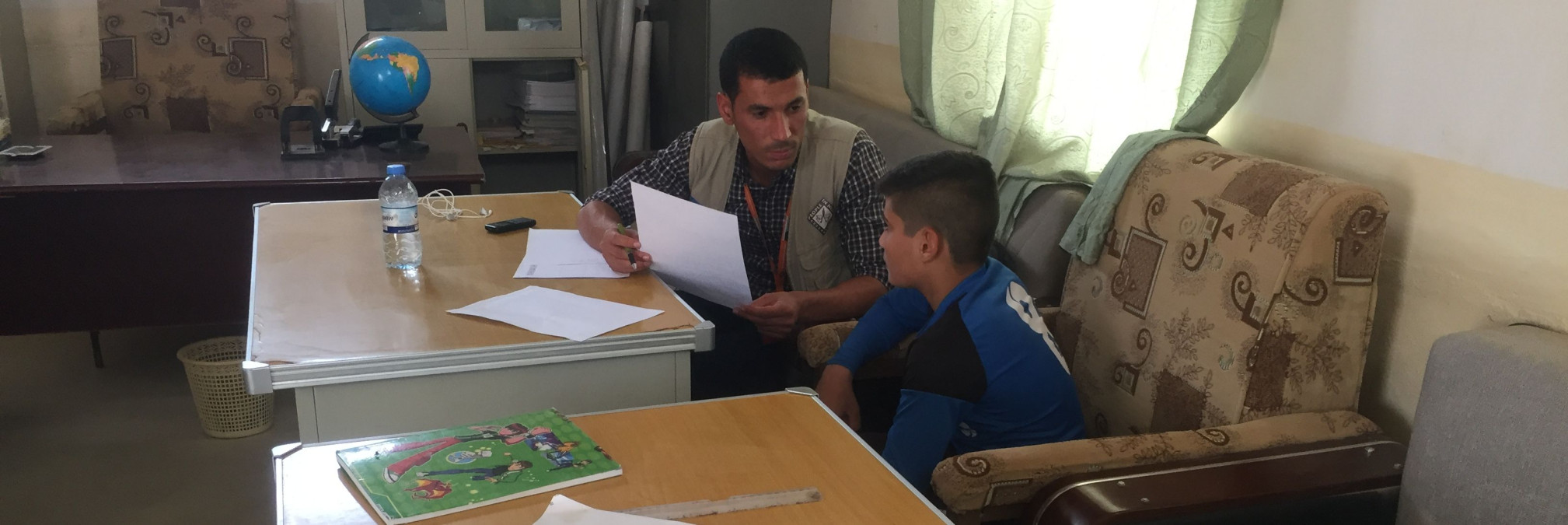"Children showed a lot of improvements after psychosocial support sessions," says teacher from Iraq
Published: Nov 15, 2018 Reading time: 4 minutes Share: Share an articleAfter the fall of the so-called Islamic State (ISIL) in October 2017, people are returning to Hawiga district in northern Iraq and children are going back to school. But many schools are damaged and lack basic equipment like learning and teaching materials.

Many boys and girls have not been able to attend school in the last three years and are dealing with stress caused by the conflict. Fourteen-year old Wathiq from Zrariya village is one of them.
After Wathiq completed fifth grade, the conflict erupted and everything stopped. "ISIL opened new schools and mandated children to attend, but my father forbid me to go," Wathiq says. "I have been out of school for three years, which has made me feel bad. We stayed inside the house this whole time because we were scared of bombs and mines, and of dying. The ISIL war destroyed everything: homes, dreams, and our lives. I fear that the same crisis will repeat itself and destroy what we’ve built now," he says.
A lot has changed in Wathiq’s life since the area was retaken from ISIL. Now that Wathiq isn’t stuck at home, he spends most of his time playing and studying with his three best friends: Falih, Abd, and Hassan. Wathiq eagerly joined a program People in Need opened in his village to strengthen protection of children. "I started to attend catch-up classes, recreational activities and sessions which helped us to deal with trauma since the very first day," he says.
Wathiq is now in his first year of secondary school where his favourite subjects are Mathematics, Arabic and English. "After finishing my studies, I want to start a career in teaching. Firstly because I like being a teacher, and secondly I want to have a job which will help me to support my father," Wathiq says.
Bullets in math classes
Watiq is the oldest of six brothers and three sisters. His father, Nusar, 36, is a farmer. "ISIL education was a kind of brain washing; the tools used in the mathematics classes were bullets," he says. "I prevented my children from attending classes knowing that this could cost me my life," he adds.
So the children did not study. There were no educational materials or Iraqi national curricula available for the children to study at home, and Nusar was not able to send his children alone to Kirkuk outside the conflict zone to complete their education. "I like to see my kids going to school with their friends every day, but it is very hard for me to see them going there wearing very bad clothing and having no stationery. I will be happy to see them completing their education and finishing what I dream of. And also having a good job, not like mine," Nusar says.
There’s one person who can help Wathiq fulfil his dream of teaching: Mohammed, a teacher from Ibn Massoud school. Through People in Need’s programme, the 34-year-old teaches Arabic, English and Mathematics. He most likes teaching children how to read and write. "Wathiq is one of my students who attends every day. He is very committed to participating in all types of activities. He is one of the best students that we have in Ibn Massoud School," Mohammed says. "After attending People in Need’s activities, the children showed a lot of improvements and positive progress especially after psychosocial support sessions," Mohammed explains.
Together with colleagues he now tries to convince other teachers to use all the techniques from People in Need’s training. "We are thinking how to integrate the psychosocial sessions and awareness activities into our education system. I was very lucky to get a training on child protection and psychosocial support because I didn’t have any previous experience related to these terms," Mohammed says. He feels the teaching curricula together with such activities are the main driving force behind the positive change in the lives of the children.
Protective environment for 3,000 children
The availability of education and child protection services is severely limited in Iraq; those that do exist lack the capacity to cope with the increase in needs. To regain a sense of normalcy, children need a protective environment in their community. The children of today are tomorrow’s teachers, doctors, engineers, and scientists. The restoration of education, as well as strengthening of child protection services, is critical in establishing stability and fostering the development of Iraq.
This is why People in Need teamed up with ACTED, and with generous support of European Commission through its Civil Protection and Humanitarian Aid Operations (ECHO), supports 3,000 children affected by the conflict in Hawiga.
"We should advise all the parents to present more focus on their children, understanding their needs and supporting their dreams," Mohammed says. "Hopefully we will continue living in peace.”



